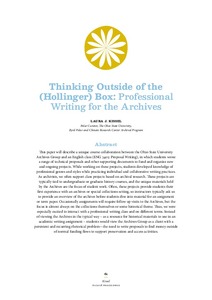Thinking outside of the (Hollinger) box : professional writing for the archives
Kissel, Laura J. (2019)
Kissel, Laura J.
Lapin yliopisto
2019
Julkaisun pysyvä osoite on
https://urn.fi/URN:NBN:fi-fe2019102334443
https://urn.fi/URN:NBN:fi-fe2019102334443
Tiivistelmä
This paper will describe a unique course collaboration between the Ohio State University Archives Group and an English class (ENG 3405: Proposal Writing), in which students wrote a range of technical proposals and other supporting documents to fund and organize new and ongoing projects. While working on these projects, students developed knowledge of professional genres and styles while practicing individual and collaborative writing practices. As archivists, we often support class projects based on archival research. These projects are
typically tied to undergraduate or graduate history courses, and the unique materials held by the Archives are the focus of student work. Often, these projects provide students their first experience with an archives or special collections setting, so instructors typically ask us to provide an overview of the archives before students dive into material for an assignment or term paper. Occasionally assignments will require follow up visits to the Archives, but the focus is almost always on the collections themselves or some historical theme. Thus, we were
especially excited to interact with a professional writing class and on different terms. Instead of viewing the Archives in the typical way – as a resource for historical materials to use in an academic writing assignment – students would view the Archives Group as a client with a persistent and recurring rhetorical problem—the need to write proposals to find money outside of normal funding flows to support preservation and access activities.
typically tied to undergraduate or graduate history courses, and the unique materials held by the Archives are the focus of student work. Often, these projects provide students their first experience with an archives or special collections setting, so instructors typically ask us to provide an overview of the archives before students dive into material for an assignment or term paper. Occasionally assignments will require follow up visits to the Archives, but the focus is almost always on the collections themselves or some historical theme. Thus, we were
especially excited to interact with a professional writing class and on different terms. Instead of viewing the Archives in the typical way – as a resource for historical materials to use in an academic writing assignment – students would view the Archives Group as a client with a persistent and recurring rhetorical problem—the need to write proposals to find money outside of normal funding flows to support preservation and access activities.
Kokoelmat
- Artikkelit [465]
